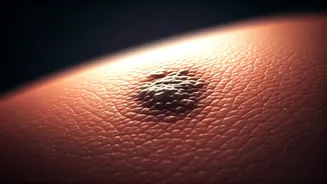Pollution's Skin Impact
The air we breathe, particularly in metropolitan areas, carries various pollutants that silently harm our skin. These tiny particles, including particulate
matter, ozone, and volatile organic compounds, interact with the skin's surface, triggering a cascade of issues. One major concern is inflammation. Pollutants provoke inflammatory responses within the skin, which can lead to increased sensitivity, redness, and the breakdown of collagen and elastin—critical components for maintaining youthful skin. Furthermore, pollutants can disrupt the skin's natural barrier function. This barrier, composed of lipids and proteins, acts as a protective shield, preventing moisture loss and blocking the entry of harmful substances. When this barrier is compromised, the skin becomes more vulnerable to dryness, irritation, and the penetration of pollutants, leading to a vicious cycle of damage and further vulnerability. Prolonged exposure can contribute to accelerated aging, pigmentation changes, and the development of acne and other skin conditions. Therefore, protecting the skin from pollution exposure becomes vital for maintaining healthy skin.
Acne and Breakouts Rising
The increase in acne and breakouts, particularly in urban areas, is directly linked to pollution. Pollutants clog pores and foster the growth of acne-causing bacteria. The skin's natural oil, sebum, traps these particles and creates a breeding ground for bacteria, leading to inflammation and the formation of pimples, blackheads, and whiteheads. Moreover, pollution can disrupt the delicate balance of the skin's microbiome. This microbiome, composed of various bacteria, fungi, and viruses, plays a crucial role in maintaining skin health. When pollutants alter this balance, it can promote the overgrowth of harmful bacteria, which worsens acne and increases the risk of skin infections. Additionally, the inflammation caused by pollution can exacerbate existing acne conditions. Chronic inflammation weakens the skin's immune response, making it more susceptible to breakouts and prolonging healing times. Therefore, managing acne in polluted environments requires a multifaceted approach, including regular cleansing, exfoliation, and the use of products specifically designed to combat the effects of pollutants.
Premature Aging and Pigmentation
Exposure to pollutants accelerates skin aging. Pollutants generate free radicals, unstable molecules that damage skin cells. This oxidative stress breaks down collagen and elastin, leading to wrinkles, fine lines, and a loss of skin elasticity. Additionally, pollutants can interfere with the skin's natural repair mechanisms, slowing down the turnover of skin cells and contributing to a dull, uneven complexion. The development of pigmentation issues, such as dark spots and uneven skin tone, is another significant consequence of pollution. When the skin is exposed to pollutants, it triggers an overproduction of melanin, the pigment responsible for skin color. This overproduction can lead to hyperpigmentation, characterized by the appearance of dark patches on the skin. Pollution-induced inflammation can also worsen existing pigmentation problems. Therefore, incorporating antioxidants into a skincare regimen can help neutralize free radicals and protect the skin from premature aging and pigmentation changes, while regular exfoliation can help remove dead skin cells and promote a brighter, more even skin tone.
Power of Skincare Routine
A robust skincare regimen is essential to counteract pollution's negative impacts. Regular cleansing is the foundation, removing pollutants from the skin's surface and preventing pore-clogging. Cleansing should be followed by the application of antioxidants, such as vitamin C and vitamin E, to neutralize free radicals and protect the skin from oxidative stress. Exfoliation helps remove dead skin cells and promotes cell turnover, resulting in a brighter complexion. Sunscreen is also crucial, as it protects the skin from UV radiation, which can exacerbate the effects of pollution. Furthermore, using products specifically designed to combat pollution, such as those containing ingredients like activated charcoal or chelating agents, can help to remove pollutants and protect the skin from damage. Consulting with a dermatologist can provide personalized guidance on selecting the best products and establishing a skincare routine that suits individual needs. Consistency and the use of appropriate products are critical to minimizing pollution's effects and maintaining healthy, radiant skin.















